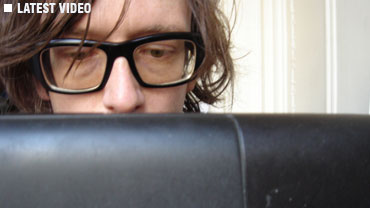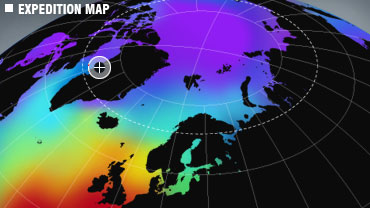Navigation
Follow the Cape Farewell expedition to the Arctic, the frontline of climate change, with over 40 artists, scientists and musicians including Jarvis Cocker & Ryuichi Sakamoto. 25 Sept to 6 Oct 2008.
Popular Posts
View posts by
- Carol Cotterill (16)
- Chris Wainwright (2)
- David Buckland (9)
- David Noble (9)
- Emily Venables (17)
- Feist (6)
- Francesca Galeazzi (7)
- Graham Hill (2)
- Hannah Bird (5)
- Jarvis Cocker (15)
- Joe Smith (14)
- Jonathan Dove (2)
- Jude Kelly (3)
- Julian Stair (3)
- Kathy Barber (10)
- KT Tunstall (21)
- Laurie Anderson (3)
- Lemn Sissay (12)
- Lori Majewski (4)
- Marcus Brigstocke (9)
- Martha Wainwright (9)
- Matt Wainwright (13)
- Michèle Noach (4)
- Mojisola Adebayo (3)
- Nathan Gallagher (23)
- Nicole Krauss (2)
- Peter Gilbert (2)
- Quentin Cooper (6)
- Robyn Hitchcock (8)
- Ruth Little (3)
- Ryuichi Sakamoto (6)
- Sam Collins (3)
- Shlomo (10)
- Simon Boxall (7)
- Sophie Calle (1)
- Sunand Prasad (11)
- Suzan-Lori Parks (8)
- Tracey Rowledge (2)
- Vanessa Carlton (6)
- Vicky Long (5)




13 Comments
Marije de Haas
Dear all,
I was watching this lecture by David Keith at Ted.com about geo engineering:
http://www.ted.com/index.php/talks/david_keith_s_surprising_ideas_on_climate_change.html. He poses a few very interesting questions, and I was wondering what the general view on geo engineering was on the boat?
* I am aware you probably won’t be able to watch this video on the boat…
Sunand Prasad responds to Marije’s question
What do the Cape Farewell crew think of Geo-Engineering as a solution to climate change?
Well, we haven’t all discussed it in depth, but from a few conversations its clear that we share 1: serious worry about the unintended consequences of some of the proposals that have been aired; 2: incredulous amusement about the complete lunacy of others and 3: ill temper at the thought of the promise of technological quick fixes distracting attention from tackling the cultural challenge that climate change poses.
Seeding the oceans or growing algae to re-absorb carbon dioxide from the atmosphere may win Richard Branson’s £25m prize but might they accelerate rather than slow the death of the oceans? As for space mirrors to reflect the suns rays, the problem is surely not too much sun but the loss of balance of distribution of its energy. Some of the more outlandish proposals certainly have entertainment value like blasting the earth into a wider orbit or altering the tilt of its axis, as long as we leave it there.
For a few centuries we have done something that seemed so innocent at the time: get stuff out of the ground and burn it. We are only just appreciating the effects this had on the fine balance that produced and sustained for several thousand years the conditions for our civilisations to flourish. There are effective, feasible solutions for mitigating climate change available now, only the political will is lacking. There are promising new technologies desperately needing investment. We need to be open to all ideas including Geo-engineering which is likely to be a key part of adaptation to climate change: building dikes and barrages against flooding, for example. But climate change needs a more fundamental rethinking of our relationship with the earth.
anton
It’s warm out there ?
mark
Just thought you would like to know
Syun-Ichi Akasofu, Community Perspective
Recent studies by the Hadley Climate Research Center (UK), the Japan Meteorological Agency, the National Oceanic and Atmospheric Administration, the University of East Anglia (UK) and the University of Alabama Huntsville show clearly that the rising trend of global average temperature stopped in 2000-2001. Further, NASA data shows that warming in the southern hemisphere has stopped, and that ocean temperatures also have stopped rising.
The global average temperature had been rising until about 2000-2001. The International Panel for Climate Change (IPCC) and many scientists hypothesize rising temperatures were mostly caused by the greenhouse effect of carbon dioxide (CO2), and they predicted further temperature increases after 2000. It was natural to assume that CO2 was responsible for the rise, because CO2 molecules in the atmosphere tend to reflect back the infrared radiation to the ground, preventing cooling (the greenhouse effect) and also because CO2 concentrations have been rapidly increasing since 1946. But, this hypothesis on the cause of global warming is just one of several.
Unfortunately, many scientists appear to forget that weather and climate also are controlled by nature, as we witness weather changes every day and climate changes in longer terms. During the last several years, I have suggested that it is important to identify the natural effects and subtract them from the temperature changes. Only then can we be sure of the man-made contributions. This suggestion brought me the dubious honor of being designated “Alaska’s most famous climate change skeptic.”
Syun-Ichi Akasofu is a former director of the Geophysical Institute and the International Arctic Research Center, both on the campus of the University of Alaska Fairbanks.
lucy
I’m curious – Does witnessing the vastness of the arctic and the extent of global warming make you feel fatalistic?
Rachel
There is a quote: ‘This, too, will pass’
You are living in the now of the Arctic, aware of the way it is changing; how powerful or powerless do you feel to affect the way it will change?
If the change is coming to pass regardless, what is our purpose?
Big Questions, hope there’s space or time to answer them-
Rachelx
Marcus Brigstocke responds to Rachel’s question
As Marcus’ reply is quite lengthy, you can read it on his blog
Mark Brandon
Hi All,
I thought Dr Boxall would be interested in this. Nature Geoscience are publishing a paper on Jakobshavn Isbræ on Oct 1 2008. The abstract available online in advance publication says:
Acceleration of Jakobshavn Isbræ triggered by warm subsurface ocean waters
David M. Holland, Robert H. Thomas, Brad de Young, Mads H. Ribergaard & Bjarne Lyberth
Observations over the past decades show a rapid acceleration of several outlet glaciers in Greenland and Antarctica. One of the largest changes is a sudden switch of Jakobshavn Isbræ, a large outlet glacier feeding a deep-ocean fjord on Greenland’s west coast, from slow thickening to rapid thinning in 1997, associated with a doubling in glacier velocity. Suggested explanations for the speed-up of Jakobshavn Isbræ include increased lubrication of the ice–bedrock interface as more meltwater has drained to the glacier bed during recent warmer summers and weakening and break-up of the floating ice tongue that buttressed the glacier. Here we present hydrographic data that show a sudden increase in subsurface ocean temperature in 1997 along the entire west coast of Greenland, suggesting that the changes in Jakobshavn Isbræ were instead triggered by the arrival of relatively warm water originating from the Irminger Sea near Iceland. We trace these oceanic changes back to changes in the atmospheric circulation in the North Atlantic region. We conclude that the prediction of future rapid dynamic responses of other outlet glaciers to climate change will require an improved understanding of the effect of changes in regional ocean and atmosphere circulation on the delivery of warm subsurface waters to the periphery of the ice sheets.
http://www.nature.com/ngeo/journal/vaop/ncurrent/abs/ngeo316.html
Makes your measurements very useful doesn’t it?
Calm seas and sunny skys!
Exzact
Don’t you think that the amount of carbon / damage you do in making capefarwell is larger than the benefits?
Your journey looks amazing, and your mission is admirable, however, all it is doing to me so far, is making me want to go to the Arctic too and burn more carbon that way?
Also, how are you raising awareness to industry, economists and policy makers with who can actually make laws that can make a difference?
Good luck
Hannah Bird responds to Exzact’s question
We take steps to reduce our carbon impact [our sustainability policy can be found in our strategic plan 2008-2011 available online – for example we have installed solar panels in our old London office, the boat in the Arctic cruises not at full steam, but what we also factor into our decision making is the potential for change and influence following the expedition. We have an amazing onboard crew of artists from many disciplines, of decisions makers, film makers and two science crews – we have acted as the catalyst to enable this, already there are projects being carried out and plans for creative collaborations into the future. We believe that this expedition is an unbelievable opportunity to engage these individuals [and their audiences] with the climate challenge, to allow them to experience first hand the ‘Canary in the Coal Mine’ of climate change that is the Arctic. Standing at the edge of the Jakobshavn Glacier, one of the fastest moving Glaciers in the world truly is standing on the frontline of climate change.
With respect to the influence of Cape Farewell on key industry, economists and policy makers. At the beginning of the expedition, we received a note of support from the Prime Minster of Great Britain. We believe artists have a powerful voice to help enable a cultural response and ultimately achieve the cultural shift which is needed if we are to face the climate challenge. We don’t work in isolation to try and make this happen.
Hannah Bird
Juan Pablo
You are all truly inspiring people. Now, I’ve just returned from the Youth expedition and I learned my fair share from the Arctic beauty and from the other voyagers, but what do you all have to say to the youth around the world? Any tips or plans for us to share with our schools? Truly appreciate it. I am excitingly following your trip, and I hope we get to talk about both of them one day. Good luck…
Hannah Bird responds to Juan’s question
Hi Juan,
Thanks for your questions and for taking part in the youth expedition, please check the education section of http://www.capefarewell.com for various resources, ideas and activities for schools, our ambition is that climate change is taught right across the curriculum and not only restricted to being taught in isolation in say science or geography lessons. Climate change is a cultural issue which demands a cultural response – it requires a creative approach and we hope that our education programme will help achieve that in schools and young people. But you have to do your bit too! Now you have returned from the Arctic it is up to you to share your stories and lessons and help others to understand the beauty of what we stand to lose.
What do ‘we’ have to say to the youth? Perhaps the question you should be answering is what do ‘they’ have to say to ‘us’!
enoch
did you all get a chance to catch the US VP Debate? what do you think of the question asked about whether climate change was man-made?
senator biden did not hesitate to say “yes, definately”. governor palin, well, she didn’t seem to answer the question.
any thoughts or comments to help governor palin understand that to “fix” climate change, we need to understand what is causing it? (maybe after that, can send some evidence to her that the world wasn’t created 6000 years ago 😉
😉
Vanessa Bellardinelli
Dear everyone,
I have been following your adventures since day one (and before) mainly because I know my good friend Francesca (ciao Fra!) was going to be part of it. I must admit I find it very entertaining and interesting and I am genuinely very jealous of you all! No many people in this world have had and will have the chance to see what you are seeing right now, also because for its very nature, the Artic is a forever-changing environment.
As a distant follower of your expedition, I would like to bring my contribution to the climate change debate and maybe trigger some further interesting discussions on board and on this blog. The reason why I am writing this is because I feel quite pessimistic about this project and about climate change in general.
In my opinion, the mistake many scientists (and most humanists) seem to make when it comes to discussing global warming is to consider mankind as the ultimate master of its own destiny. That is clearly wrong. We don’t need to mention Darwin to understand that we are like any other animal on this planet – i.e. just another specie. Unfortunately for Earth, the dominant specie happens also to be the most rapacious, destructive and predatory one. There is no room for environmental control or behavioural change here. If Darwin has taught us anything, it is that species are a mere assembly of genes that interact randomly with the each other and with changing environments. Human settlements, even with their advanced technology, are no different from anthills or bee hives. The exploitation and destruction of our planet has nothing to do with capitalism, global economy, progress, etc. It is the logical consequence of the evolution of an exceptionally destructive and rapacious specie: ours.
Some say that modifying our behaviour, changing the way we live is possible. I think they are wrong as they misplace their trust on a specie that has always acted for its own sake. Mankind behaviour has always been moved by greediness and primal urges. Though our needs may have changed, we haven’t.
As for progress and technology, they are something that human kind cannot control. They highlights the weakness and fragility of our nature. Changing the way we live is possible but not in the direction scientists are indicating. Human history proves that we tend to get accustomed to commodities and ultimately, we use them to satisfy our (greedy) needs; whatever it takes, whatever shumble we leave behind. Even Cape Farewell is highly dependent on technology as it relies on GPS, cameras, recorders, computers, etc. These things pollute. We all know that every attempt to change our lifestyle would be deeply unsuccessful. In Darwin’s words: no species can control their own faith.
Before leaving you to your beautiful experience, I would like to say one more thing. I often read headlines or mottos such as “Save the planet”. The truth is…we are not trying to save the planet here. The planet will outlived us all just as it has outlived dinosaurs, meteorites, ice ages, etc. It will may change shape, look different, have different inhabitants but it will not perish. What we are really trying to do here is saving OUR planet – i.e. our habitat. Not for the sake of polar bears, tigers, pandas or else. We are doing this for us. And that’s because we know that in a less hospitable environment mankind is doomed to extinction. Well, I think we signed up for our extinction a long time ago, perhaps when we were first created. Our “dinosaurization” is well underway…
I look forward to hear the outcomes of your debates on the blog.
Best luck to everyone – a special best wish to Francesca (well done girl!).
Vanessa Bellardinelli
Jenny
Hello! I’ve got a question for anyone/everyone…on behalf of the dana centre team. what do you think is the most inspiring thing about arctic ice, for you?
Mark Carline
Do you think that its too late to change global warming and perhaps now we should start to plan for a changing world and accept whats going to happen ?
p.s. I’m a big big KT fan – any chance of more video!?
Keirsten Johnson
I really would like to know why you asked different artist to join you and how you went about doing so? I think it’s really interesting that they agreed to do this and they must be benefiting from it greatly. Also, I would like to know what Feist and KT will take home with them from this experience.
Oh, since I am a HUGE Feist fan, I would like to state again that Feist should write a book. I love reading her post because she writes so well. Just saying…
KJ